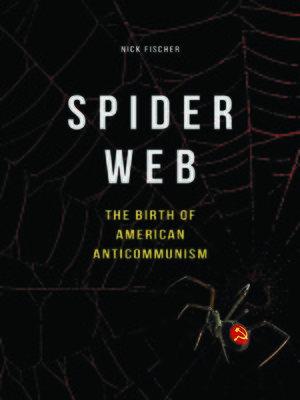
Sign up to save your library
With an OverDrive account, you can save your favorite libraries for at-a-glance information about availability. Find out more about OverDrive accounts.
Find this title in Libby, the library reading app by OverDrive.



Search for a digital library with this title
Title found at these libraries:
| Library Name | Distance |
|---|---|
| Loading... |
The McCarthy-era witch hunts marked the culmination of an anticommunist crusade launched after the First World War. With Bolshevism triumphant in Russia and public discontent shaking the United States, conservatives at every level of government and business created a network dedicated to sweeping away the "spider web" of radicalism they saw threatening the nation. In this groundbreaking study, Nick Fischer shines a light on right-wing activities during the interwar period. Conservatives, eager to dispel communism's appeal to the working class, railed against a supposed Soviet-directed conspiracy composed of socialists, trade unions, peace and civil liberties groups, feminists, liberals, aliens, and Jews. Their rhetoric and power made for devastating weapons in their systematic war for control of the country against progressive causes. But, as Fischer shows, the term spider web far more accurately described the anticommunist movement than it did the makeup and operations of international communism. Fischer details how anticommunist myths and propaganda influenced mainstream politics in America, and how its ongoing efforts paved the way for the McCarthyite Fifties—and augured the conservative backlash that would one day transform American politics.|
Cover
Title Page
Copyright
Contents
Illustrations
Introduction
Chapter 1. The Origins of American Anticommunism, ca. 1860–1917
Chapter 2. The First World War and the Origins of the Red Scare
Chapter 3. Here Come the Bolsheviks! The Russian Revolution and the Red Scare
Chapter 4. The Spider Web Chart
Chapter 5. Mapping a Political Network: The Anticommunist Spider Web
Chapter 6. John Bond Trevor, Radicals, Eugenics, and Immigration
Chapter 7. Jacob Spolansky: The Rise of the Career Anticommunist Spook
Chapter 8. The Better America Federation and Big Business's War on Labor
Chapter 9. Political Repression and Culture War
Chapter 10. Anticommunism and Political Terror
Chapter 11. The Mythology of Anticommunism
Chapter 12. Antidemocracy and Authoritarianism
Conclusion: Legacies of the Spider Web
Afterword
Notes
Bibliography
Index
|
"Fischer expands our perspective of anti-communism temporally, shifting it to these late nineteenth-century roots, and deepens our understanding of it to contain clearly, and from its earliest origins, a laissez faire, open shop agenda. . . . This book will be welcomed and appreciated by those interested not only in the history of communism but also in understanding the limits of American politics in the twentieth century."—American Communist History
"Fischer's sweep is broad; his results are impressive. Recommended."—Choice
"Refreshingly original."—New York Review of Books
|Nick Fischer is Adjunct Research Associate of the School of Philosophical, Historical and International Studies at Monash University, Melbourne.
"Fischer's sweep is broad; his results are impressive. Recommended."—Choice
"Refreshingly original."—New York Review of Books
|Nick Fischer is Adjunct Research Associate of the School of Philosophical, Historical and International Studies at Monash University, Melbourne.







